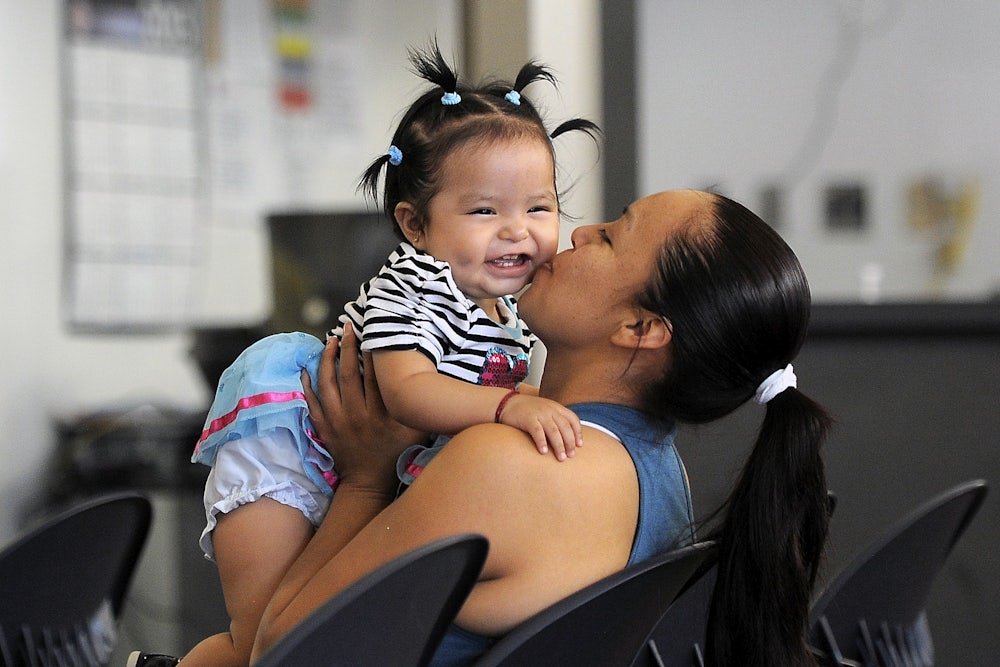Two months ago, I wrote in this space about how Congress was threatening to allow funding for the Children’s Health Insurance Program (CHIP) and community health centers to expire. It did. I lamented how this imminent disaster for millions of poor Americans who rely on government assistance for medical care was being utterly neglected. It still is. And we’re now witnessing the consequences of that inaction.
In five states (Arizona, California, Minnesota, Ohio, and Oregon) and the District of Columbia, what funding remained for CHIP will run out by the end of December. Federal officials found $542 million in leftover cash in September, but that is now gone. More than half the states will have no cash for their programs by March 2018.
Officials in eleven states are sending letters to unsuspecting parents as early as this week, warning them that their children will no longer be able to get insurance in the near future, absent congressional action. Instead of using scarce funds to get children vaccinations, they’re spending it on mass mailings delivering the bad news. West Virginia has already voted to close down CHIP on February 28 if nothing is done. Other states are scrambling for alternatives, creating worries for families and mass confusion. Without re-authorization, all 8.9 million children and 370,000 pregnant women enrolled through CHIP would have their coverage put at risk. And given how invisible this issue has been on Capitol Hill, that isn’t an unthinkable scenario.
Meanwhile, the 1,400 local clinics that provide comprehensive primary care to 26 million poor Americans have no idea how they’ll survive without billions in federal aid, which got cut off September 30.
About half of the grant periods for community health centers restart February 1, at which point those clinics will receive less or no money. Officials cannot engage in any long-term planning with the uncertainty about their funding levels. But they will likely see hiring freezes, layoffs, reduced hours, and cancelled expansions. The resulting reduction in access is likely to cost 9 million people their main method of health care. Even if funding miraculously arrives it could be too late for administrators who need to plan budgets.
As I noted in September, these programs—vital to at least 18 million Americans combined—serve more vulnerable populations than those in the exchanges under the Affordable Care Act. What’s more, they are bipartisan and relatively popular programs that serve urban and rural communities alike, and have been reauthorized countless times in the past. So what’s the holdup?
For one, everything’s such a four-alarm fire in Washington these days that routine items get overlooked. But there is a policy disagreement as well: House Republicans have drawn the line at how to pay for the extensions. The House actually passed a bill that extended CHIP for five years and community health centers for two. But they covered the $24 billion price tag in part by raiding the ACA’s Public Health and Prevention Fund and increasing Medicare premiums for marginally wealthier seniors. Democrats balked, and the Senate hasn’t been able to come up with a formula that is agreeable to both parties.
But the money is right there for the taking. It turns out that Republicans are considering legislation that gives nearly all of its $1.5 trillion in tax cuts to large corporations and the wealthy. If those groups were given, say, $1.476 trillion in tax cuts instead—a reduction of 1.6 percent—there would be enough to pay for the continued health coverage for 18 million people.
In fact, here’s a better idea. You could just not give tax cuts at all to corporations that are flush with cash, and instead use the federal government’s prodigious resources to ensure that the poorest among us don’t collapse in the streets from untreated illnesses. It’s just a wacky suggestion about what our national priorities should be.
The juxtaposition of these extremes should be dominating headlines right now. At a time when the two biggest Republican priorities on a jam-packed congressional agenda are spending more money on military equipment and letting corporations hang on to more of their record profits, American citizens—mostly children—are going to suffer and endure pain and even die because no politician can find a relative pittance to fund successful programs that assist them. We say “where is the outrage” so much these days that the potential to shock has dissipated, but this is a rare moment when outrage is wholly warranted.
Congress has to juggle a lot of issues in the last month of the year, including funding the government, dealing with DREAMers, authorizing additional hurricane relief, and renewing the National Flood Insurance Program, insurance company payments under the ACA, and one part of the Foreign Intelligence Surveillance Act. There will be a lot of motivation to throw as many of these issues as possible into one giant omnibus package where everybody can tout a victory.
But there’s really no reason to do that with CHIP and the community health centers. There’s no disagreement on the merits of these programs. There’s no compromise to be worked out. The pay-fors are a red herring, as revealed by the budget-busting evident in simultaneous measures. There is no convincing rationale to hold back from passing this bill today, if not sooner.
If Washington can’t figure out how to keep 18 million of the poorest Americans from losing critical assistance—directed through uncontroversial policies at that!—then members of Congress should leave town and be forced to stand post at emergency rooms in their districts, explaining how they screwed this one up so badly. Or maybe we can tie funding for Congress’s own health plans to the ones helping poor pregnant women and children. If they can’t fund the latter, why do politicians deserve the former?
